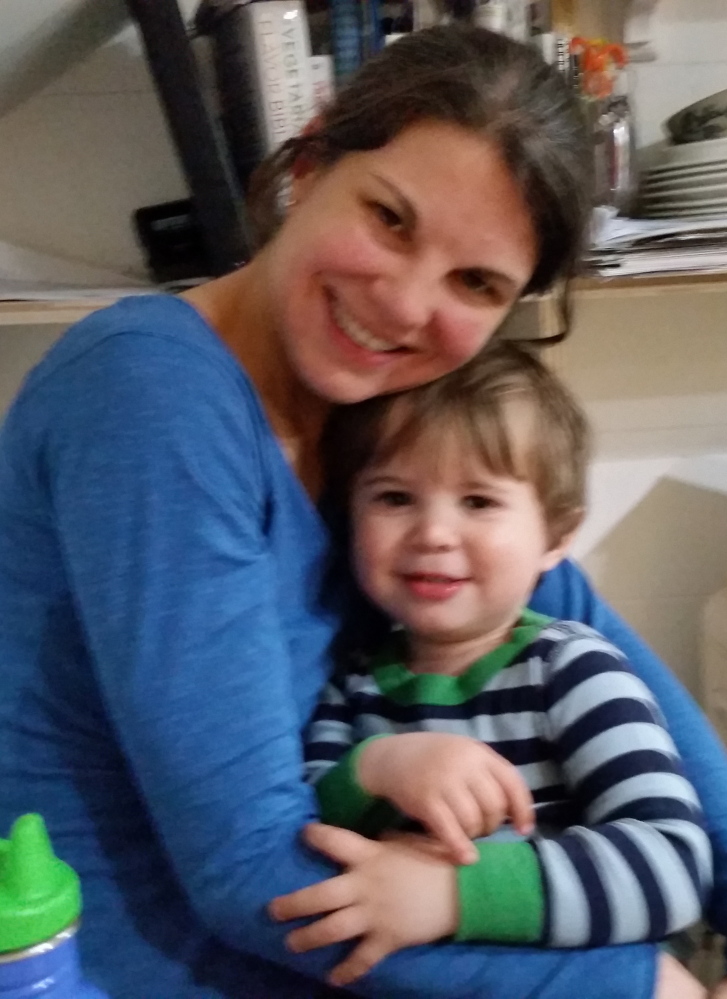Becoming a mother changed me in many ways – I sleep less, cook more and accept messy as the new normal.
But one thing that hasn’t changed in the past two years and two months is my commitment to vegetarian eating. In fact, my son’s arrival in the world has profoundly deepened the long list of reasons I eat a plant-based diet.
I started eating vegan food in 1991 during my freshman year at Syracuse University. I was already a vegetarian when I arrived on campus, but a book I soon read, “Diet for a New America” by John Robbins, opened my eyes to the scale of the animal agriculture industry and the scope of the problems connected to it.
I’d learned about factory farming while a sophomore at Oak Hill High School in Wales, but I hadn’t yet connected the dots to dairy and eggs.
My immediate family drank raw goat’s milk on the small organic farm in Litchfield where I grew up. My mother milked our goats by hand. But at my grandfather’s 200-head dairy farm in Richmond, the cows made a twice daily visit to the assembly-line milking parlor, where each nipple was dipped in bleach and then sucked into a mechanized milking machine. From there, the milk ran through clear plastic tubes up toward the ceiling and into the stainless steel milk tank in an adjacent room.
The cows were milked even when their udders were cracked, bleeding or infected. Moreover, the milk running in the tubing overhead was stained and unclean.
But the most significant difference between my family’s farm and my grandfather’s farm had to do with the babies. On the farm where I grew up, the goats were allowed to keep their babies and nurse them. We claimed only a bottle or two of milk. In contrast, all the fragile newborn calves on my grandfather’s farm were taken from their mothers a mere hour after they were born.
As a child, I often heard the low moans of the grieving mothers echoing in the barn, but I didn’t understand why they sounded so sad. Now that I’m a mother, I think about those cows and their babies all the time.
An hour after my son’s birth he was at my breast, and I didn’t put him down for four hours. The days, weeks and months that followed were filled with endless breastfeeding that sometimes went on for hours at a time and every hour or two right through the night.
Still, I’m one of the lucky ones to whom breastfeeding presented few challenges. Even so, I struggled through many long feeding sessions pinned to a chair or a couch or a bed, utterly exhausted but unable to sleep. I was often uncomfortable and itching with desire to get up and do something, anything. What kept me going was the knowledge that my temporary discomfort was hugely beneficial to my child.
And during those long stretches of time with nothing to look at but my child’s head and my familiar walls, I was haunted by thoughts of my grandfather’s cows.
I’d wonder what those patient, peaceful creatures thought as they stood with their massive, pregnancy-sore bodies on the bare concrete of the milking parlor. In my memory, they still stand in the brightly lit room with a loud machine connected to their udders where their missing babies should have been.
How long did they grieve their babies? Did their hearts burn with aching? Did they feel despair? Were their dreams filled with the sad faces of their calves? I’ll never know.
With my own son nursing in my arms, I was pained by the memories of how the bull calves were quickly sold off to veal farmers or directly to the slaughterhouse. Meanwhile, the heifers were separated from their mothers and raised on another farm until they were old enough to breed. Then they followed their mothers into the cycle of pregnancy and lactation. When their milk production declined, they too were sold off to the slaughterhouse.
Now that I’m a mother, I often wonder how to raise my child to be kind and compassionate in a world where these character traits are often devalued. What will he think when he learns about factory farms? How long can I shield him?
It will be difficult enough to explain the truth behind large-scale dairy farms. But how will I ever explain industrial meat? I hope I have many years to prepare. In the meantime, I aim to be a gentle and patient mother as I help him build his compassion and critical-thinking skills.
There’s no question I’m different from my pre-motherhood self. I now understand the deep emotional bond between mother and child. And I also know how the sacred art of breastfeeding can feel like a burden, but a burden one willingly bears.
I don’t want what I eat to cause suffering for mothers and babies. This Mother’s Day I am more committed than ever to vegetarian eating.
Avery Yale Kamila is a freelance food writer who lives in Portland. She can be contacted at:
avery.kamila@gmail.com
Twitter: AveryYaleKamila
Send questions/comments to the editors.



Comments are no longer available on this story